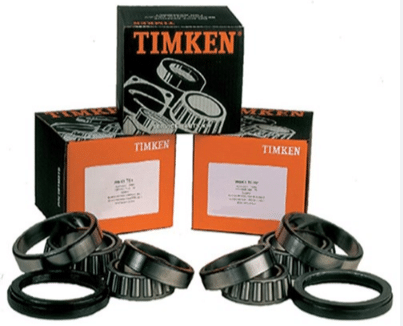
Introduction:
TIMKEN and SKF are two prominent players in the bearing industry, each known for producing high-quality bearings. As essential components in various industrial applications, bearings must possess specific characteristics to ensure optimal performance, durability, and efficiency. In this article, we will conduct an in-depth analysis of the characteristics of TIMKEN bearings and SKF bearings, exploring their design features, materials, load-carrying capacity, precision, resistance to extreme conditions, and application-specific solutions.
Design Features:
a. TIMKEN Bearings:
TIMKEN’s bearings are renowned for their robust design, featuring larger rollers and optimized internal geometry. This design enhances the bearings’ load-carrying capacity, making them suitable for heavy-duty applications in industries such as mining, construction, and agriculture.
b. SKF Bearings:
SKF’s focus on precision engineering results in bearings with tight tolerance levels and minimal internal clearances. Their precision design ensures smooth operation, reduced friction, and low vibration, making them ideal for precision machinery and automotive applications.
Material Selection:
a. TIMKEN Bearings:
TIMKEN’s decades of experience have led to expertise in materials science. They use premium-grade steel alloys, combined with specialized heat treatments, to achieve high hardness, strength, and wear resistance. This material selection contributes to TIMKEN bearings’ ability to withstand harsh operating conditions and heavy loads.
b. SKF Bearings:
Similarly, SKF utilizes high-quality steel and advanced materials, including hybrid bearings with ceramic balls. The use of ceramic balls reduces friction, lowers heat generation, and enables higher rotational speeds, making SKF bearings well-suited for high-speed applications.
Load-Carrying Capacity:
a. TIMKEN Bearings:
TIMKEN bearings are known for their exceptional load-carrying capacity, making them ideal for heavy-duty industrial applications. Their robust design and optimized load distribution enable them to handle heavy radial and axial loads with ease.
b. SKF Bearings:
While SKF bearings also exhibit excellent load-carrying capabilities, they are particularly favored in applications requiring high-speed operation and precision, where their hybrid bearings with ceramic balls provide superior performance.
Precision and Tolerance:
a. TIMKEN Bearings:
TIMKEN bearings are engineered for precision, achieving tight tolerance levels to minimize internal clearances. This precision engineering ensures smooth and consistent performance, making them suitable for precision machinery applications.
b. SKF Bearings:
Precision is a hallmark of SKF’s bearings, with a focus on minimizing tolerances for improved accuracy and reduced friction. Their bearings find extensive use in industries where precise motion control and low vibration are critical.
Resistance to Extreme Conditions:
a. TIMKEN Bearings:
TIMKEN’s specialized heat treatment and material selection provide their bearings with excellent resistance to extreme temperatures, wear, and harsh operating environments. This makes TIMKEN bearings well-suited for heavy industries and rugged applications.
b. SKF Bearings:
SKF’s hybrid bearings, embedded sensors for condition monitoring, and advanced sealing solutions contribute to their bearings’ durability and longevity under extreme conditions. Their ability to withstand contaminants and moisture makes them suitable for demanding environments.
Application-Specific Solutions:
a. TIMKEN Bearings:
TIMKEN offers a wide range of application-specific bearing solutions tailored to various industries. Their bearings are optimized for heavy-duty applications, ensuring reliable performance in specific industrial sectors.
b. SKF Bearings:
Similarly, SKF focuses on providing bearings for specific industries, including automotive, aerospace, and renewable energy. Their innovative technologies, such as sensor-embedded bearings, cater to application-specific demands.
Conclusion:
In conclusion, both TIMKEN and SKF bearings possess unique characteristics that cater to a diverse range of industrial applications. TIMKEN’s bearings are distinguished by their robust design and exceptional load-carrying capacity, making them ideal for heavy-duty applications. On the other hand, SKF’s focus on precision engineering, hybrid bearings, and innovative technologies positions them as leaders in high-speed and precision applications.
When selecting between TIMKEN and SKF bearings, consider the specific requirements of your application, load capacity, speed, precision, and operating conditions. Both brands are reputable manufacturers with a proven track record of delivering high-quality bearings tailored to meet diverse industrial needs. Conducting a thorough analysis and consulting with bearing experts will enable you to make an informed decision, ultimately leading to enhanced machinery performance, extended bearing life, and improved overall efficiency.
